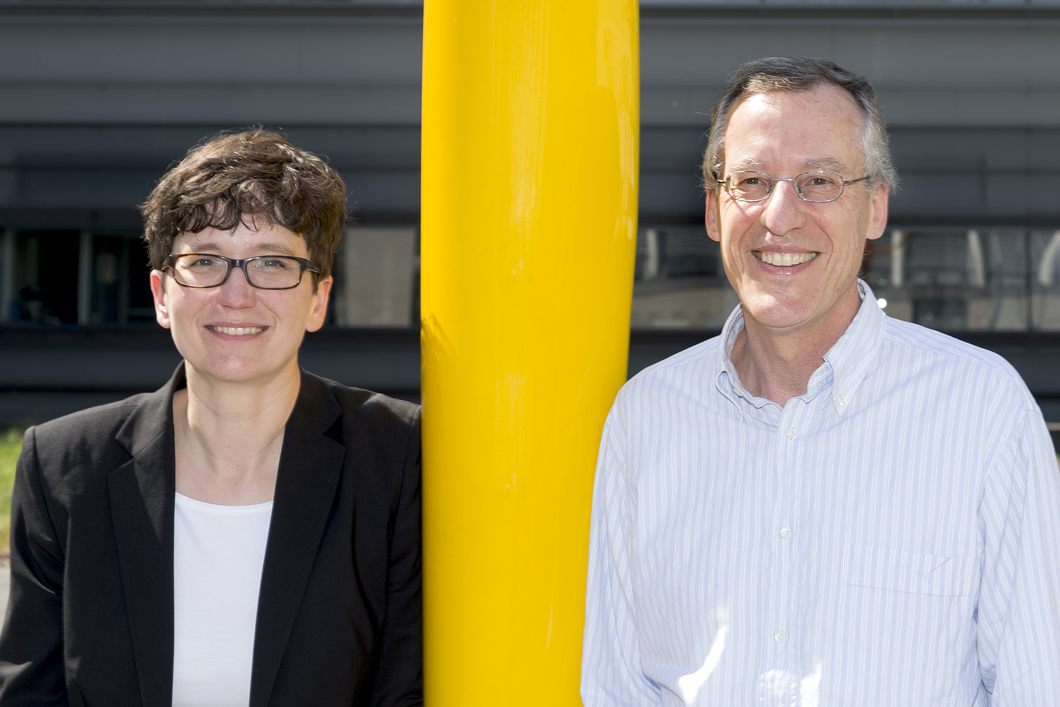
Professional and human symbiosis: Prof. Manuel Piedade (right) together with Dr. Franziska Emmerling (left) during his scientific sabbatical at BAM in Adlershof.
Source: BAM
Manuel Piedade is an associate professor of Chemistry and Biochemistry at the Faculty of Sciences of the University of Lisbon (FCUL). As part of a sabbatical leave, he came to Berlin-Adlershof, more precisely to BAM. Here, together with Dr. Franziska Emmerling, head of the Analytical Chemistry; Reference Materials Department and her team, he is conducting research on mechanochemical synthesis, which plays a major role in developing pharmaceuticals. At BAM, he enjoys the peace and quiet, which allows him to concentrate on his scientific work.
Manuel Piedade, you are a researcher from Lisbon and now you are at BAM – how did this come about?
FCUL is part of the University of Lisbon, which is Portugal’s leading university. It aims to promote research-based student education and the transfer of scientific knowledge into society. Sabbatical leaves are encouraged at FCUL because they allow researchers to focus on new research projects and collaborations. I am currently interested in understanding how molecules self-organize under different environments and stimulus to form solids. BAM has a great international reputation in this field. The group around Dr. Franziska Emmerling complements my research and my team in Lisbon, in particular with regard to expertise and techniques. We met at a COST (European Cooperation in Science and Technology) project meeting and subsequently engaged in a very fruitful collaboration. A sabbatical at BAM, therefore, became a logical step for me to fully concentrate on my research and exchange ideas with BAM scientists.
Why did you choose BAM and what do you appreciate here?
It is a luxury to be able to focus solely on research for a while. In Lisbon my work routine is a lot more hectic because I have to find a balance between teaching, management, bureaucracy and my research. I particularly enjoy the relaxed and friendly atmosphere here and of course the excellent scientific infrastructure at BAM. The opportunity to network with other institutes in Adlershof is also a big plus. At BAM I work closely with Dr. Franziska Emmerling. It’s not only a wonderful symbiosis in terms of the professional work but also on a human level.
What is the objective of your joint research?
We have various objectives. Our main objective is to develop new methods for selectively controlling mechanochemical reactions. The key topic is the chemical behaviour of substances under mechanical impact. Mechanochemistry provides a fast and green method to obtain substances that often cannot be prepared by other methods. For example, it is currently used in the production of pharmaceuticals. We use a device known as a ball mill, whose core looks a bit like a surprise egg. This device has been utilized in several PhD projects by Dr. Franziska Emmerling’s group. One of the PhD students, Dr. Franziska Fischer, who was awarded the Adlershof Ph.D. prize for her work. We are particularly interested in developing an apparatus that allows molecular level insights into how the energy associated with a mechanochemical process is related with the observed chemical reactivity. This will, hopefully, help us understand how the outcome of a mechanochemical synthesis can be controlled by a judicious selection of experimental conditions. The goal is to make it possible to combine active ingredients in medications more precisely. We have recently submitted two research proposals partially focused on this topic. We submitted one to the Foundation for Science and Technology (FCT) Portugal and another to the German Research Foundation (DFG). Both of them have been approved.
What do you wish for your further research? What will you take with you?
I would definitely like to continue the collaboration with BAM’s Adlershof team (they are family now!) It would be easier to have the BAM campus in Adlershof close to Lisbon. Together we would probably make a perfect research centre. On the other hand, I would then miss the luxury of quiet scientific work away from home. I think I’d rather leave BAM in Berlin and commute between the two locations. But I am trying to take some of the technical know-how from our current work back to Lisbon to help advance our research there. And of course I also hope that my expertise will provide new impulses to the BAM team.


